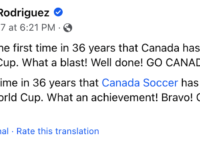The inclusion of copyright term extension in Deputy Prime Minister and Finance Minister Chrystia Freeland’s Budget 2022 may have been buried toward the very end of the last annex of the budget on page 274, but the issue has been front and centre for Freeland for many years. Indeed, Freeland has been well aware of the hidden costs arising from term extension since she was first elected in 2015. In her roles as Minister of International Trade, Minister of Foreign Affairs, and now Finance Minister, term extension has arisen repeatedly as she worked first to avoid term extension and later to maintain flexibility if forced into implementing the change.
Having fought to maintain that flexibility, it is now essential to establish a registration requirement, which would allow rights holders that want the extension to get it, while ensuring that many other works enter the public domain at the international standard of life plus 50 years. By providing for life plus 50 and the option for an additional 20 years, Canadian law would be consistent with Berne Convention formalities requirements and with its trade treaty obligations.











